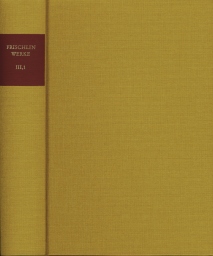Nicodemus Frischlin: Band III,1: Priscianus vapulans (Der geschlagene Priscian); Iulius redivivus (Julius Caesars Rückkehr ins Erdenleben)
›Priscianus‹ und ›Iulius‹ are Frischlin’s two most well-known dramas. This is the first publication in a modern German translation. The appendixes contain the dedications, the prefaces and the afterwords from all of the editions published during Frischlin’s lifetime, also with a German translation. In his work »Priscianus« (first published in Strasbourg in 1580) Frischlin went back to the early years of humanism. In the course of the play Priscianus, the old Latin grammarian,the embodiment of classical Latinity, meets members of all four faculties who almost torture him to death with their technical jargon. In the end, Erasmus and Melanchthon appear as representatives of humanism and cure the mistreated old man of his sufferings by using drastic measures. Praise of the standard which had been reached in imitating ancient Latinity is also a main subject in ›Iulius‹ (first published in Strasbourg in 1580). Caesar and Cicero, risen from the underworld, admire the splendor of the large German cities, the art of war made possible by the German invention of gunpowder and the high level of literary education as well as the art of printing, also invented in Germany and useful as a magnificent medium for propagating these.
Reviews
»Edition und Übersetzung werden, dessen kann man sich jetzt schon sicher sein, Frischlin neue Leser zuführen.«
»Der Band III,1 publiziert die wohl populärsten Dramen Frischlins, die hier erstmals auch in einer modernen Übersetzung nachzulesen sind. […] Dem frommann-holzboog Verlag darf man zu zwei verdienstvollen Bänden gratulieren.«
»Damit erfährt die vielseitige und bisweilen tiefgründige Dramenkunst des Philologen, Panegyrikers und Satirikers nun endlich ihre adäquate Würdigung, vor allem aber öffnet sich jetzt deren bislang für den modernen Leser noch weitgehend unzugängliche, für das Verständnis des scharfsinnigen Autors aber unverzichtbare Tiefensemantik. Die Renaissanceforschung, insbesondere die im Einzelnen noch längst nicht erschöpfend beantwortete Frage einer vielschichtigen Antikenrezeption in Deutschland um 1600 erhält somit eine wichtige zusätzliche Basis.«
All volumes
- Band III,1: Priscianus vapulans (Der geschlagene Priscian); Iulius redivivus (Julius Caesars Rückkehr ins Erdenleben) – available
- Band III,2: Phasma – available
- Band III,3: Kommentar zu ›Priscianus vapulans‹ (Der geschlagene Priscian) und ›Iulius redivivus‹ (Julius Caesars Rückkehr ins Erdenleben) – available
- Band IV,1: Deutsche Dichtungen und Entwürfe – April 2026
- Band IV,2: Deutsche Dichtungen Kommentar – in preparation
- Band V,1: Lyrik I (1562-1572) – available
- Band V,2: Lyrik II (1573–1577) – May 2026
- Band V,3: Lyrik III (1578–1586) – in preparation
- Band V,4: Lyrik IV (1587–1590, Undatierbares) – in preparation
- Band V,5: Lyrik Kommentar – in preparation
- Band VI,1: Epische Dichtungen I – in preparation
- Band VI,2: Epische Dichtungen II – in preparation
- Band VI,3: Epische Dichtungen Kommentar – in preparation
- Band VII,1: Reden I – in preparation
- Band VII,2: Reden II – in preparation
- Band VII,3: Reden III – in preparation
- Band VII,4: Reden IV – in preparation
- Band VII,5: Reden V – in preparation
- Band VII,6: Reden Kommentar – in preparation
- Band VIII,1: Abhandlungen I – in preparation
- Subject Areas
- New Publications
- ---
- Critical Editions
- Abaelardus: Dialogus
- Andreae: Gesammelte Schriften
- Arnauld / Nicole: L'Art de Penser
- Böhme: Die Urschriften
- Böhme: Gesamtausgabe
- Bolzano: Gesamtausgabe
- Droysen: Historik
- Fichte: Gesamtausgabe
- Fischart: Sämtliche Werke
- Franck: Sämtliche Werke
- Frischlin: Sämtliche Werke
- Hülser: Die Fragmente zur Dialektik der Stoiker
- Harnack: Einleitung in das neue Testament
- Hauptmann: Sämtliche Werke
- Hegel: Vorlesungen über Rechtsphilosophie 1818-1831
- Herder: Studien und Entwürfe
- Jacobi: Briefwechsel - Nachlaß - Dokumente
- Locke: Anleitung des menschlichen Verstandes
- Maimon: Gesamtausgabe
- Meier: Beyträge
- Melanchthon: Briefwechsel
- Mendelssohn: Gesammelte Schriften
- Nicolai: Sämtliche Werke – Briefe – Dokumente
- Reinhold: Korrespondenzausgabe
- Reuchlin: Briefwechsel
- Reuchlin: Sämtliche Werke
- Scaliger: Poetices libri septem
- Schelling: Historisch-kritische Ausgabe
- Schelling: Münchener und Berliner Nachlass
- Schickard: Briefwechsel
- Shaftesbury (Anthony Ashley Cooper): Standard Edition
- Steiner: Schriften
- Svarez: Gesammelte Schriften
- Thomas von Aquin: De Unione
- Weigel: Sämtliche Schriften. Neue Edition
- Collected Works
- Series
- Bibliographies and Reference Books
- Allgemeine Zeitschrift für Philosophie
- AZP Beihefte
- Jahrbuch der Psychoanalyse
- JP Beihefte
- Steiner Studies
- Open-Access
- Single volumes
- eBooks
- Special Offers
- ---
- Authors
- Publishing house
- Links / Partner
- Paths to Philosophy
